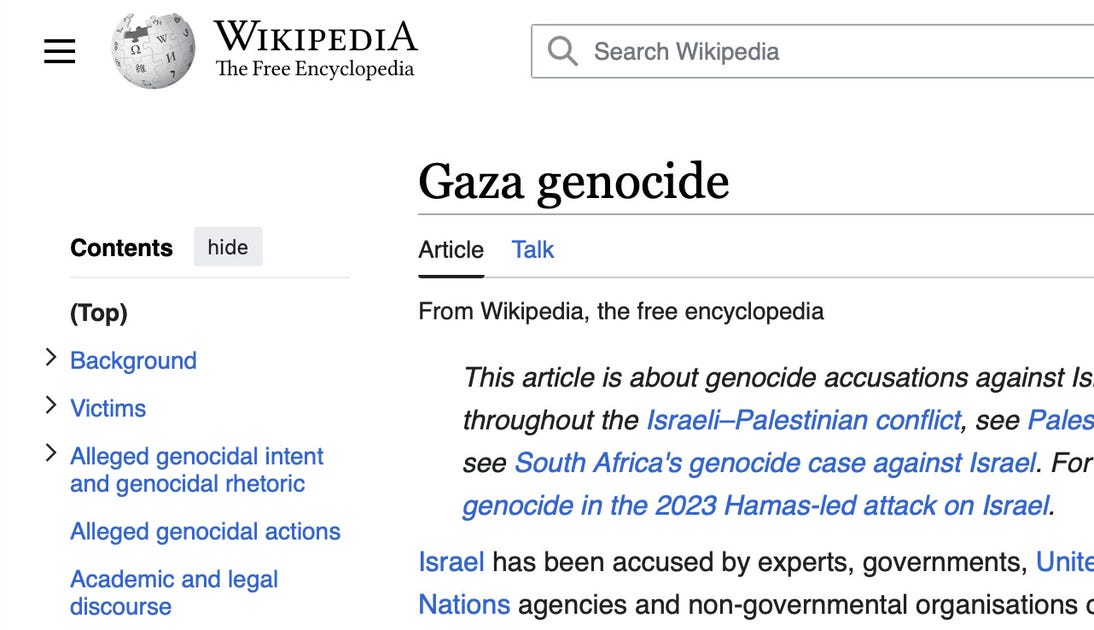On July 25, after a couple of months of debate, the Wikipedia entry “Allegations of genocide in the 2023 Israeli attack on Gaza” was changed to “Gaza genocide.” This was done despite the fact that the International Court of Justice in the Hague has not made an official ruling on the matter, in the wake of South Africa’s petition to the court alleging that Israel is committing or facilitating genocide in Gaza.
The Los Angeles-based Jewish Journal, which followed the Wikipedia discussion and vote, wrote that the editors who voted on this change claimed to be relying on an academic consensus based on statements of experts on genocide, human rights, human rights law and Holocaust historians.



Wikis are unsuitable for contentious topics. Wikis are there to crowdsource objective facts about the world (all it takes is one person to add any given fact, so they will relatively quickly contain lots of facts). They were not invented as a tool, and should never have started to be used as such, to determine one single truth about contentious issues.
well, yea, Wikipedia is not a court, but the ICJ would take a decade to decide and we need awareness/action now rather than when they are all dead, so
Is Israel following at least one of these?
Israel committing genocide is not a contested subject among human rights organisations.
Playing the devil’s advocate here: the existence of hell is not a contested subject among abrahamitic clerical organizations.
I think it’s hard to compare the bias of organizations that have an anti-war stance and organizations that literally believe in mythical beings.
Don’t play devils advocate with genocide because of the damage denial can do. Also religious faith can’t be solved or contested through evidence, unlike legal determinations through a court or scientific findings. Giving the same weight or importance to any opinion is post modernism. And if only opinion matters and not truth or facts, then only strength matters.
This is a false equivalent argument but also for the record the existence of hell is absolutely contested among Abrahamic clerical organizations.
well i mean, most human rights orgs dont like war or people dying, so im not really sure why that’s a surprise.
Designating something as a genocide is not a matter of opinion – it’s a legal definition.
yup, and the court hasn’t deliberated just yet, so there is no actual determination as to what’s going on.
Several genocide scholars seem to be convinced on the matter, though:
https://www.aa.com.tr/en/middle-east/what-we-are-seeing-in-gaza-is-a-repeat-of-auschwitz-says-genocide-expert/3202869#
https://www.latimes.com/opinion/story/2023-11-19/israel-hostages-gaza-bombing-civilians-genocide-holocaust-studies
https://www.npr.org/2024/03/29/1241576419/u-n-expert-says-israel-has-committed-acts-of-genocide-in-gaza
the NPR article itself quotes a block about how experts believe there is “grounds for genocidal acts to be committed” which is a bit of a far shoot from “experts believe there is active genocide” happening.
And just so we’re on the same page here, i’m inclined to agree with the assessment that there is significant potential for genocide to occur in this environment. My problem is the explicit nature and totality of the usage of the term which i find to be irresponsible.
An homicide is an homicide before the court case for it is done. Just because some words also have legal definitions it doesn’t mean that they’re incorrectly used before the judge concluded them and the guilty party.
Maybe easier to visualise with assault. Assault happened from the moment the aggression happened, not from the moment the aggressor got convicted of it
Right, that’s why the ICJ exists
But they don’t call all such events genocides.
they don’t and that is true, but there is a relative predisposition there in that regard.
I don’t know if you’ve ever read through a debate on a contentious and well attended topic on Wikipedia, but they tend to differ to experts, academics, and reliable sources, as it’s a Wikipedia policy (the easiest policy to appeal to in fact).
Sounds like this was more than one ‘point of fact’ or on lone editor at play. Perhaps we read to different things here:
Sounds like they used high quality reliable sources to define the characterisation of the events. Which is a very Wikipedia approach to take.
You should listen to the podcast “Stuff you Should Know” episode on Wikipedia called “The Big Episode on Wikipedia”.
Wikipedia doesn’t really quite work like you stated, and especially the huge topics like this, they tend to be more factual, detailed, accurate, and researched than even long established encyclopedias.